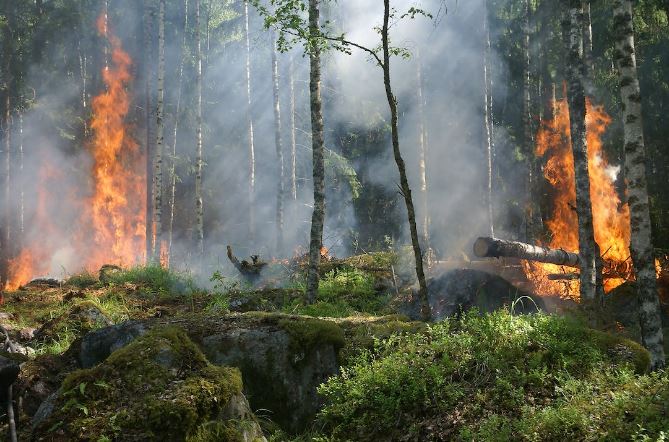
Thousands evacuated on Spanish island
Aug 18, 2023
Tenerife [Spain], August 18: Firefighters yesterday struggled to contain a wildfire that broke out in a mountainous national park on the Spanish island of Tenerife amid hot and dry weather.
Prompting authorities to evacuate nearly 4,500 people.
"This is the most complex fire we've had in the Canary Islands in the last 40 years," the region's leader, Fernando Clavijo, told a news conference.
He added they were racing to control the blaze before an expected increase in temperatures at the weekend.
While waterbombing aircraft managed to stabilise the blaze south of the Mount Teide volcano - Spain's highest peak - the flames advanced "out of control" on the northern flank across dry woodland towards a valley where several camping sites are located, blanketing much of the island with smoke and ash.
"When you go outside you start suffocating. It's as if you have something stuck in your throat," said Alba Gil, 37, resident of the village of La Esperanza where authorities ordered people to stay home due to the heavy smoke. She and her family stayed up until 4 a.m. worried about the flames higher up the mountain.
The fire, which broke out on Wednesday, has burned through at least 2,600 hectares (6,425 acres) of land.
Scorching heat and dry weather this summer have contributed to unusually severe wildfires in Europe and western Canada. Hawaii's Maui was also hit by wildfires which have killed at least 106 people, forced tens of thousands of people to evacuate and devastated the historic resort city of Lahaina.
Scientists say climate change, driven by fossil fuel use, has led to more frequent and more powerful extreme weather events.
Last week's heatwave in the Canary Islands left many areas bone dry, heightening the risk of wildfires.
Authorities warned the spreading blaze could lead to further evacuations and confinement, advising people to stay tuned to public service alerts. So far, 3,820 people were ordered to stay home, said civil protection chief Montse Roman.
A prison and a migrant reception centre were in the areas under confinement.
Authorities deployed 17 aircraft and a combined 350 firefighters and military personnel. Additional waterbombing aircraft arrived from the mainland.
"We are watching the big mountain and the blaze, we saw this firewall and we'll see if they can control it, the situation seems pretty bad," said local resident Celestino Suarez, 53.
All access to the mountains on the island, including tourist-favourite Mount Teide and the Teide Astrophysics Institute, has been closed off to prevent any incidents.
Tenerife's two airports were operating normally, Spanish airport operator Aena said.
Firefighters on Thursday struggled to contain a wildfire that broke out in a mountainous national park on the Spanish island of Tenerife amid hot and dry weather, prompting authorities to evacuate nearly 4,500 people.
"This is the most complex fire we've had in the Canary Islands in the last 40 years," the region's leader, Fernando Clavijo, told a news conference.
He added they were racing to control the blaze before an expected increase in temperatures at the weekend.
While waterbombing aircraft managed to stabilise the blaze south of the Mount Teide volcano - Spain's highest peak - the flames advanced "out of control" on the northern flank across dry woodland towards a valley where several camping sites are located, blanketing much of the island with smoke and ash.
"When you go outside you start suffocating. It's as if you have something stuck in your throat," said Alba Gil, 37, resident of the village of La Esperanza where authorities ordered people to stay home due to the heavy smoke. She and her family stayed up until 4 a.m. worried about the flames higher up the mountain.
The fire, which broke out on Wednesday, has burned through at least 2,600 hectares (6,425 acres) of land.
Scorching heat and dry weather this summer have contributed to unusually severe wildfires in Europe and western Canada. Hawaii's Maui was also hit by wildfires which have killed at least 106 people, forced tens of thousands of people to evacuate and devastated the historic resort city of Lahaina.
Scientists say climate change, driven by fossil fuel use, has led to more frequent and more powerful extreme weather events.
Last week's heatwave in the Canary Islands left many areas bone dry, heightening the risk of wildfires.
Authorities warned the spreading blaze could lead to further evacuations and confinement, advising people to stay tuned to public service alerts. So far, 3,820 people were ordered to stay home, said civil protection chief Montse Roman.
A prison and a migrant reception centre were in the areas under confinement.
Authorities deployed 17 aircraft and a combined 350 firefighters and military personnel. Additional waterbombing aircraft arrived from the mainland.
"We are watching the big mountain and the blaze, we saw this firewall and we'll see if they can control it, the situation seems pretty bad," said local resident Celestino Suarez, 53.
All access to the mountains on the island, including tourist-favourite Mount Teide and the Teide Astrophysics Institute, has been closed off to prevent any incidents.
Tenerife's two airports were operating normally, Spanish airport operator Aena said.
Source: Fijian Broadcasting Corporation






